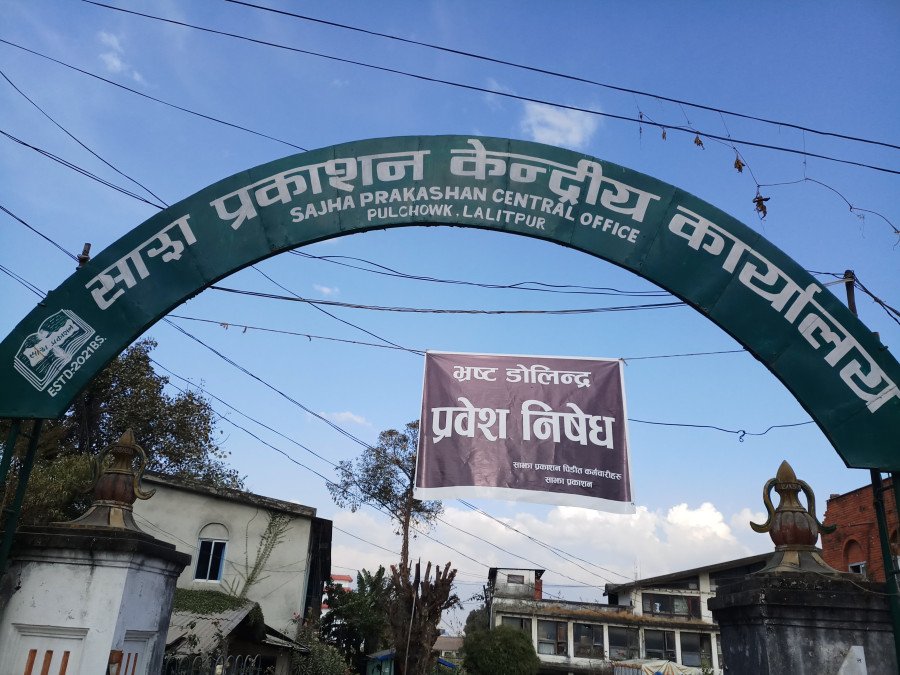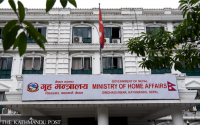National
Once a mighty publication, Sajha struggles amid financial woes
Sajha Prakashan was once a behemoth, established with enormous investment and resources from the government. The institution now is a pale shadow of what it used to be.
Bibhu Luitel
Sajha Prakashan was once a behemoth, established with enormous investment and resources from the government. But the half-a-century old institution today is a pale shadow of what it used to be.
Most of the existing officers have been unpaid for over two years while retired officers have not received their provident fund. For over five months, employees have been staging protests on the premises of the publishing house against General Manager Dolindra Prasad Sharma, who has repeatedly defended his work but has not had much to show for itself.
The problem does not end there. Having been appointed the general manager in January 2015, Sharma asked 91 staff members to resign. “Sharma said the publications was running at a huge loss and the Ministry of Finance would inject some funds to resurrect it if we resigned,” said one staffer who quit his job as section officer. Since then, he has been coming to the publications’ office at Pulchowk, Lalitpur every day to protest against Sharma.
However, much to the chagrin of the 91 staffers, Sharma hired at least 84 new personnel to fill the positions. The protesting staff have also questioned Sharma’s intent on the new hiring, as he had claimed he did not have the funds for it.
In an interview with the Post, Sharma defended his decision to hire new staff, saying that they brought along a different set of skills to the publications.
“Sajha Prakashan is a publication house. Unlike other government offices, we don’t need officers here,” Sharma said. “What we really need here are people with expertise in marketing and sales, not first-and second-class officers who have no idea how a publication house functions.”
But it’s not just the staff who have suffered under Sharma’s leadership. Some writers say they have had trouble getting paid for their work as well.
Sarubhakta Shrestha, the author of popular Nepali novel “Pagalbasti”, which has been doing really well in the Nepali market, withdrew the novel from Sajha and gave the publishing right to a private publication house. “I was frustrated with the Sajha management. I had to visit them a number of times to get my royalty cheque,” Shrestha told the Post.
The summarised version of “Ek Chihaan,” a novel by Hridaya Chandra Singh Pradhan, is included in the high school curriculum in Nepal. As per the agreement between Pradhan’s son Subrat Chandra and the Sajha Publication, the latter owes the family 10 percent of sales for the abridged version and 20 percent for the original version of ‘Ek Chihaan’ out of the total sales.
“I have not received a single penny for two years now,” Subrat said. When the sales went completely down, he published the novel on his own and gave the sales right to Sajha.
“I had to do that. Not only because I wanted to save the creation of my father, but also because it’s part of the high school curriculum.”
The publication’s debts have since stacked up to nearly Rs173 million. “Sajha lacks the budget and cannot pay all its creditors,” an employee at the publication’s accounts section revealed to the Post.
While Sajha’s debt continues to mount, the publication has mortgaged its property in Pulchowk. However, of the seven ropanis of the land, only four ropanis belongs to Sajha. The remaining land has already been named as collateral for the Janak Shiksha Samagri Kendra.
So when General Manager Sharma took out a loan in excess of Rs86 million against all the seven ropanis, some officials were furious.
“We had no idea that Sajha didn’t own all of the land. We never verified it before signing the agreement,” said Laxmi Kumar Rimal, a section officer at the Finance Ministry, suggesting two options for the Sajha.
“Either three ropanis of land under Janak Shiksha Samagri Kendra have to be released first,” said Rimal. “Or we as a ministry have to take back our decision to issue the loan entirely.”




 20.72°C Kathmandu
20.72°C Kathmandu














